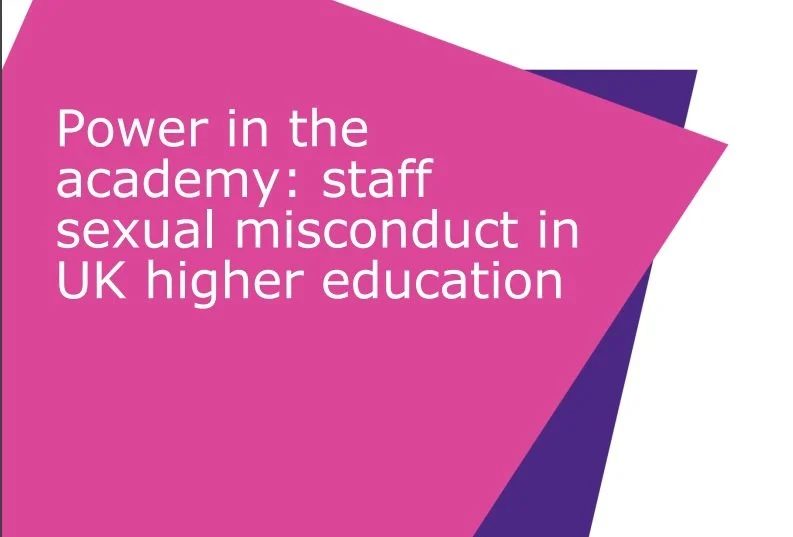
Adult Grooming in Education
At time of writing, it is not illegal for a member of academic staff to form a relationship with a student.
Whilst some universities have policies that their staff should not form relationships with students, many don’t. At CAAGe we believe it should be mandatory for the wellbeing of ALL students and staff: no-one’s career or education should be put at risk due to inappropriate relationships.
And it is not just about academic staff, and not just about Universities….
Techniques Used for Adult Sexual Grooming by Predators in Universities (Staff and Students)
(In addition to ordinary grooming techniques)
Boundary Blurring
The vast majority of Universities have policies that mean lecturers should not be forming sexual relationships with students.
(By 2020, however, only six universities in the UK prohibited sexual and romantic relationships between staff and students where there is a teaching or learning relationship.)
Lecturers are adults, their students are adults, and the lines are easily blurred, especially where universities and HE establishments have no policies in place.
There is an inherent inequality in lecturer/student relationships, which can easily blur the clear boundaries of consent.
Sexualised Communication
It might start as a cheeky or flattering comment, seemingly innocent or funny.
Over time the communication becomes increasingly sexualised until the groomers target feels either flattered or backed into a corner/coerced, and unable to say no.
They find it hard early on, because boundaries are blurred slowly, often with communication that could be misconstrued, and they don’t want to create a fuss for fear of jeopardising their place at the University.
And having accepted it once, there’s sometimes an element of guilt that they didn’t deter the communication previously and have given off ‘the wrong signals’.
Sexual Assault
Some predators simply go all out and assault students or researchers, who are afraid to report.
The reasons are numerous but include that their word won’t be believed against that of the staff member; or that if it came down to it, the University wants to retain its teaching staff and therefore will let the student go rather than lose a valued staff member.
Sharing Personal Information
The groomer will often try and relax their target by sharing deeply personal information with them, information outside of the academic sphere.
This may, perhaps be something about their marriage (true or false, ranging from bad things about their partner to the reasons they can’t leave their partner/be seen with the target (eg “My wife has cancer”, “my husband has erectile dysfunction”).
Creating Reliance
The groomer will often expand their power over their target by, for example, suggesting that they become a student’s tutor for more options or reducing the researchers options to come under the power of other lecturers.
This leaves the target more reliant than they were initially, and often puts them in a situation in which they have to accept the situation, rock the bot, or leave in order to escape.
Subtle (Sometimes) Stalking
This is a tactic to make the student feel ‘watched’ - sometimes even presented as because the student/researcher is ‘special’.
This sometimes amounts to a form of ‘subtle’ stalking, even presenting themselves at the student’s house, sometimes using work as a excuse.
Social media has made this ‘watching’ easier, and whilst ‘liking’ photos seems like a nice thing to do, it can also be a red flag for being targeted.
Similarly, singling out a student by watching them in lectures, offering special treatment or flattery, or commenting on their engagement, seems flattering, but can become sinister, especially if threats or coercion are used.
-

Staff-Student Misconduct Report
The National Union of Students and The 1752 Group conducted a national survey examining staff sexual misconduct in higher education.
Women are three times more likely than men to experience negative impacts because of misconduct;
Four in ten current students had at least one experience of sexualised behaviour from staff;
Fewer than one in ten respondents (9.6%) who experienced staff sexual misconduct reported this to their institution.
-

OFS Launches Consultation
The OFS, Office for Students, the regulatory body, has run a consultation of staff student relationships which ended in May 2023: Prevent and address harassment and sexual misconduct.
-

Sexual Misconduct by UK University Staff is Rife
Forty-one percent of students report incidents ranging from sexualised comments to rape, according to a 2018 survey by the NUS (Nations Union of Students).
Sexual Misconduct by UK University Staff is Rife, David Batty, The Guardian
-

Students’ accounts of grooming and boundary-blurring behaviours by academic staff in UK higher education
(Academic article) Tiffany Page. (2022) Sexual misconduct in UK higher education and the precarity of institutional knowledge. British Journal of Sociology of Education 43:4, pages 566-583.
-

'Linh's story: groomed by a tutor
A university student groomed by her lecturer, resulting in brutal sex, is struggling to make sense of what happened while the lecturer is already teaching at another university.
Have institutional claims of privacy have become an excuse for secrecy that allows abusers to continue operating?
He Seemed Harmless: Groomed Student Left Broken
Article by Bonnie Summer, NZ Investigations
-

Law School Professor accused
Joshua D. Wright is accused of sexual misconduct and abuse of power by female students.
The George Mason University law professor (USA) and former Federal Trade commissioner, and a founding partner at Lodestar Law & Economics, has been accused by several women who the courts are going to find it hard to disbelieve - including other lawyers.
Red flags (warning signs) to look out for - the professor….
lacks boundaries during classes.
arranges meetings with students outside of office hours, and/or and sends late-night emails to students.
socialises with students outside of the class setting.
asks students to non-university/college social events.
shows excessive interest in a particular student’s personal life.
uses social media and text messages to communicate with students.
offers certain students more attention and academic support/favouritism.
tactile (touching).
encourages drinking (alcohol) and drugs.
believes it is OK to date and sleep with students.
flirts with students.
invites students to their home.
Note that these are indicators/warning signs, not proof in themselves that someone is grooming.
UK University Policies on Student/ Staff Relationships
(Work in progress - note that the fact that Universities have a policy does not automatically mean that relationships are banned.)
-
Staff and Students Conflict of Interest
(Opens a pdf document)
-
-
-
-
-
Policy effective April 17, 2023: Policy concerning relationships between students and staff.
See news: Staff/student relationships banned
-
Staff and Student Relationships Policy
(Downloads a word document)
-
Resources for HE Providers:
Student Wellbeing and Protection: Prevent and Address Harassment and Sexual Misconduct (The OFS)
Sector Guidance (the 1752 Group): https://1752group.com/sector-guidance/


